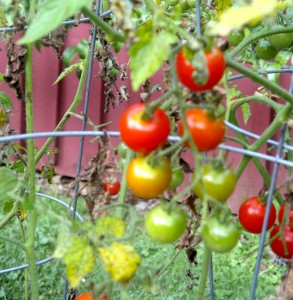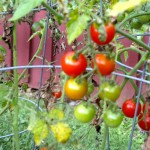 I prefer growing cherry tomatoes, as opposed to the larger varieties, because they tend to ripen faster and demand a lot less nurturing and support. Surround them with aluminum cages. Throw on a little fertilizer. Pinch back the suckers. And they’re generally good to go. My eight plants this season— four sweet 100s, three sungolds, and a black cherry — all got off to a great start. They shot up during those early warm weeks of June. By the Fourth of July, green marble-size fruit was hanging in clusters from the leafy, four-foot stalks. I remember bemoaning the loss of my lettuces to the woodchuck invasion, but declaring with confidence: “At least we’ll have a bumper crop of tomatoes this summer.”
I prefer growing cherry tomatoes, as opposed to the larger varieties, because they tend to ripen faster and demand a lot less nurturing and support. Surround them with aluminum cages. Throw on a little fertilizer. Pinch back the suckers. And they’re generally good to go. My eight plants this season— four sweet 100s, three sungolds, and a black cherry — all got off to a great start. They shot up during those early warm weeks of June. By the Fourth of July, green marble-size fruit was hanging in clusters from the leafy, four-foot stalks. I remember bemoaning the loss of my lettuces to the woodchuck invasion, but declaring with confidence: “At least we’ll have a bumper crop of tomatoes this summer.”
 But, as everyone living in the Berkshires now knows, summer just hasn’t been able to fully commit this year. Except for one hottish weekend at the end of July, it’s remained cool and temperamental. Flirting with the mid-70s in the morning, then pushing back with torrential rainstorms in the late afternoon. For the last month, the night temperatures have routinely dipped into the low 50s. My tomatoes haven’t been able to handle all that passive-aggressive weather. A few weeks ago I noticed yellowing and black spots on the leaves. Then the vines started browning. The new growth began to shrivel. I searched for possible reasons on the internet: early blight, late blight, septoria, powdery mildew. Like kids who get mumps, ckickenpox, and measles all at once, my plants seemed to have come down with every possible tomato disease simultaneously. The few remaining cherries are strung like red and gold Christmas tree lights along the sagging, leafless vines.
But, as everyone living in the Berkshires now knows, summer just hasn’t been able to fully commit this year. Except for one hottish weekend at the end of July, it’s remained cool and temperamental. Flirting with the mid-70s in the morning, then pushing back with torrential rainstorms in the late afternoon. For the last month, the night temperatures have routinely dipped into the low 50s. My tomatoes haven’t been able to handle all that passive-aggressive weather. A few weeks ago I noticed yellowing and black spots on the leaves. Then the vines started browning. The new growth began to shrivel. I searched for possible reasons on the internet: early blight, late blight, septoria, powdery mildew. Like kids who get mumps, ckickenpox, and measles all at once, my plants seemed to have come down with every possible tomato disease simultaneously. The few remaining cherries are strung like red and gold Christmas tree lights along the sagging, leafless vines.
Is it my fault — or nature’s? That question — and the whole sorry state of affairs — reminded me of the wonderful rant to God in the poem below by the former Poet Laureate Louise Glück.
Did your tomatoes fare better? If you did luck out and have a little surplus, here’s a fast and easy recipe from a post I wrote a few years back about using end-of-season cherry tomatoes : https://www.lizagyllenhaal.com/cherry-tomatoes/
Vespers Louise Glück, 1943 In your extended absence, you permit me use of earth, anticipating some return on investment. I must report failure in my assignment, principally regarding the tomato plants. I think I should not be encouraged to grow tomatoes. Or, if I am, you should withhold the heavy rains, the cold nights that come so often here, while other regions get twelve weeks of summer. All this belongs to you: on the other hand, I planted the seeds, I watched the first shoots like wings tearing the soil, and it was my heart broken by the blight, the black spot so quickly multiplying in the rows. I doubt you have a heart, in our understanding of that term. You who do not discriminate between the dead and the living, who are, in consequence, immune to foreshadowing, you may not know how much terror we bear, the spotted leaf, the red leaves of the maple falling even in August, in early darkness: I am responsible for these vines.For more poems by Louise Glück, please visit: https://www.poets.org/poetsorg/poet/louise-glück





Just today I found severe late blight on several of my plants. This happened in the space of 48 hours. Things looked great a couple days ago and then this morning, WHAM ! It devastated my crop last year and I did everything I could to prevent it this year but to no avail. I pulled 6 plants out today, pruned back the rest and reapplied the organic fungicide I’ve used faithfully all season. I knew when the nights were cold and the rain continued I was going to have trouble. So I too am mourning what is sure to be yet another failed year of tomatoes. So sad.
Oh, I’m sorry to hear this, but relieved I’m not alone. Next year I definitely plan to start pruning back the suckers earlier — and keep pruning rigorously. And, yes, more fungicide! I will say, though, which I didn’t before, that the many tomatoes I did harvest until the blight hit were delicious!
hi Liza I love your photographs as well as your (Swedenborgian? maybe just Liza)
view of nature from within, like Frost, or Mary Oliver (although you are better)
Unfortunately I cannot eat tomatoes but I can paint the way they grow
Margaret
I am doing a copy of your poppy or open peonie with dew- so lovely
Margaret — I’d love to see your poppy/peony painting when you’re ready.